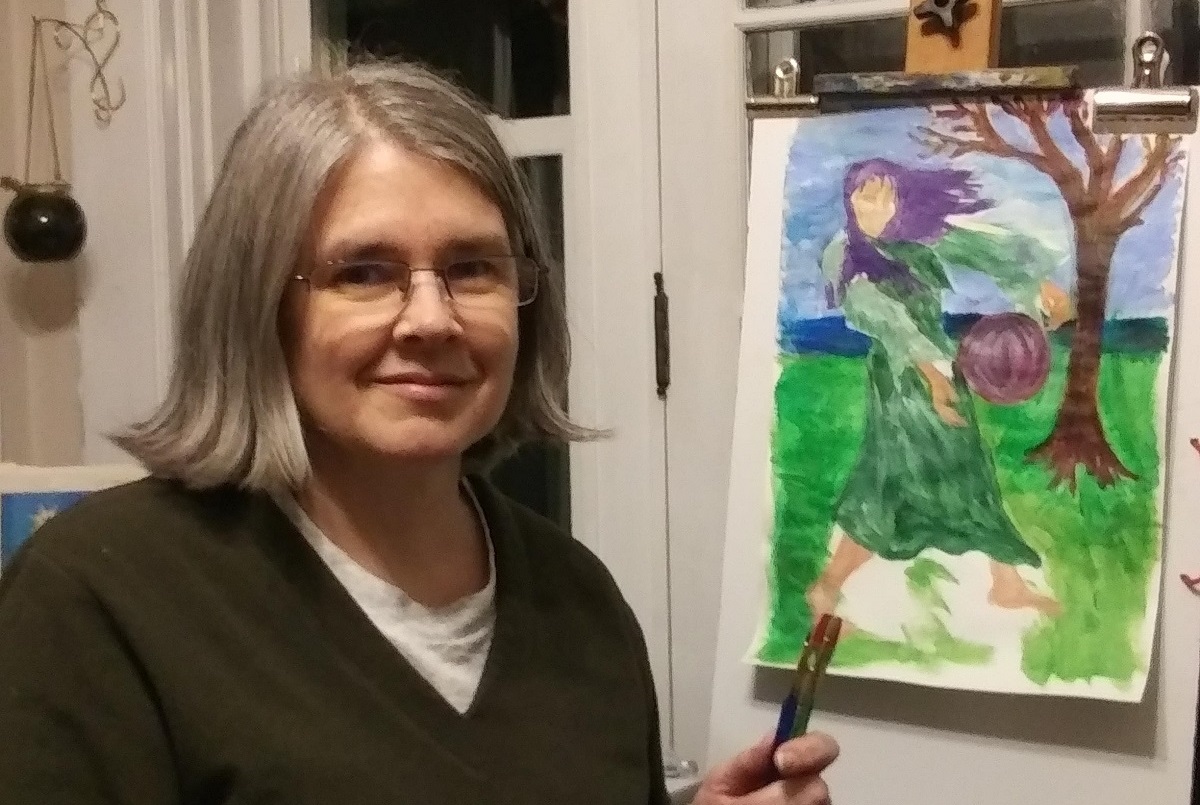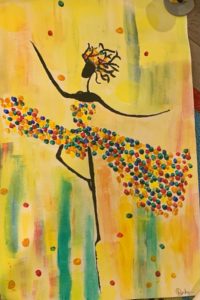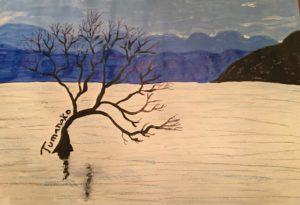Color me happier: Creative care on tap with faculty art therapy program

At the end of the day, Cindy Thomasson lets her creative juices flow – right over the stress of COVID-19 challenges that just won’t quit.
“I have been extremely stressed at work, and the impact of the pandemic has hit me hard,” said Thomasson, a physician assistant in orthopedics at Penn State Health Milton S. Hershey Medical Center. “I love art and used to make time to be creative. I had lost that recently, and this virtual art class has helped bring me back to it.”
Thomasson is one of 14 faculty members of Penn State College of Medicine who is taking advantage of a virtual art therapy studio project for COVID-19 wellness, funded by a grant from the Office of Faculty and Professional Development.
“Art therapy is a perfect way to relieve stress, feel connected, improve mood and allow for meaning in life,” said Jennifer Rudolf, a clinical psychiatric specialist with the Eating Disorders Program and a board-certified art therapist who facilitates the class. “Doing art therapy virtually means one can be creative and feel the benefits while observing physically distant guidelines. It also helps you express your feelings about being in quarantine.”

Dr. Banku Jairath, professor of pediatrics, painted “The Dancer.”
Faculty who are frontline workers are especially susceptible to neglecting themselves, she says. She thinks art therapy could be an answer for self-care during COVID.
She’s right, according to Dr. Banku Jairath, professor of pediatrics and member of the art group. “When we take even a few minutes each day to devote to a form of art, we are giving our brain a little time to unwind and relax,” she said. “In the end, you get not only your ‘me’ time, but you also find joy in your creation.”
The program, which meets virtually once a week for an hour and a half, is free and at no charge provides participants with an art kit of pastels, acrylics, watercolors, colored pencils, blending tools and paper. Each week, Rudolf sends the group prompts for their projects, such as “juxtapose life now vs. life pre-COVID,” “compare/contrast the Spanish Flu with COVID-19” or “depict a post-pandemic wish list of activities.”
Following inspiration slides and tips from Rudolf, group members work on their projects together during the virtual meeting, and they also share finished works if they choose.
“There’s a lot of bonding and support when they share their work,” said Dr. Martha Levine, psychiatrist in adolescent medicine who worked with Rudolf to secure the grant. “While I’m not an artist, I certainly know the value that creativity can bring and the importance of finding connections, even in virtual ways.”
Faculty members, many of whom are also health care providers, are stressed by new clinical expectations brought about by the pandemic, such as telehealth visits, and by isolation and uncertainty that has become a part of life over the past year, she said.
“Being part of a group like this helps each of us know, ‘I’m not doing this by myself,’” Levine said. “We all need that reassurance, no matter who we are.”

Marianne Boltz, assistant professor of ophthalmology, titled her painting “Tumaniko,” which means “hope” in the Eastern Polynesian language of the Māori people.
Heather Stuckey-Peyrot, associate professor of medicine, said the group has helped her cope both personally and professionally by giving her mind something different to land on after a busy day. “It is relaxing, and it allows me to go back to work the next morning with more focus,” she said.
“It has given me something to look forward to every Thursday evening, providing a stress-free period to escape from daily COVID-related anxiety and enjoy some social interaction that I miss so much right now,” said Marianne Boltz, assistant professor of ophthalmology.
Recently, as the grant-funded program came to its end, the group decided to continue meeting on a monthly basis, Rudolf said. “We are beginning to use the group as a therapeutic space and not just recreational art making – an important distinction in art therapy,” she said.
Rudolf says everyone should set aside time every day to do something they enjoy. “Our society doesn’t validate that, but I think it’s mandatory,” she said. “If you have something to look forward to that you enjoy doing, life will feel better.”
If you're having trouble accessing this content, or would like it in another format, please email Penn State Health Marketing & Communications.
